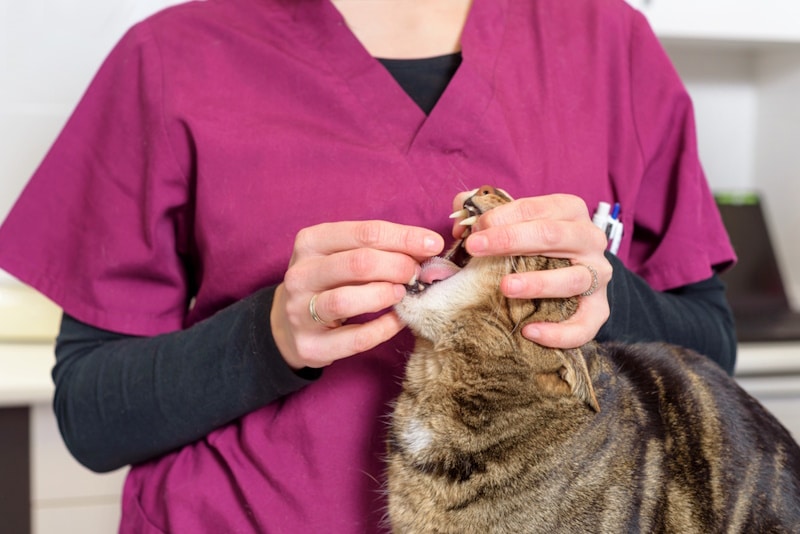- January 24, 2024
Zyrtec for Cats: Dosage, Uses, Side Effects (Vet Answer)

Allergies in cats can sometimes have the same symptoms as us – watery eyes and nose, mild congestion, and sometimes coughing. More frequently, allergies in cats will manifest as itchy skin, redness, and/or swelling of the skin.
The brand name Zyrtec may sound familiar to you. It’s a common over-the-counter (OTC) allergy medication that many of us have taken in the midst of pollen season. But can Zyrtec also be given to your cat? Yes, Zyrtec can be given to cats, but it’s important to consult your veterinarian before giving Zyrtec to your cat. In this article we’ll discuss what Zyrtec is, if and how you can give it to your cat, and potential side effects that your cat may experience.

What Is Zyrtec?
Zyrtec is the brand name for the drug Cetirizine HCL (Cetirizine Hydrochloride). Zyrtec is an antihistamine allergy medication. When your cat’s body reacts to an irritant and/or an allergen, the body will release histamine. This is a natural substance that occurs and can be released with no problems. With allergies and/or an allergic reaction, excessive histamine can cause itching, redness, and sometimes swelling. Antihistamines work by blocking histamine from attaching to certain cell receptors that then cause the effects listed above. Zyrtec is in the class of antihistamines that are classified as an H-1 blocker.

How Is Zyrtec Given to Cats?
Zyrtec is given orally. If your veterinarian recommends you give the OTC product, it comes as a tablet, chewable tablet, gelcap, or a children’s formula liquid. The gelcap will likely not be recommended due to the dosing your cat needs. If your cat is difficult to give medication to, your veterinarian may also have the medication compounded. This means that a compounding pharmacy will make the medication into different forms than what is available OTC and can also make it flavored.
Zyrtec can be given to cats every 12–24 hours, or once to twice a day. It does not have to be given with food, though giving a cat medication can be extremely difficult. Sometimes giving it in food can be much easier as your cat may eat it more easily in a snack such as tuna. Giving Zyrtec with or without food will not alter its effectiveness.

Zyrtec Dosage for Cats
It’s important that you know the current weight on your cat. Depending on the weight of your cat, the dosing for Cetirizine is 1 mg of Zyrtec per 1 kilogram of your cat’s body weight. Typically, this will be 2.5 mg to 5 mg total. However, make sure to check this with your veterinarian as they may recommend a different dose.

What Happens If You Miss a Dose?
The best part is that there are no serious side effects if a dose is not given, or if your cat just won’t allow you to give them the medication. Zyrtec is not a medication that has to be weaned up or down in order to be effective for your cat.
It’s worth noting that significant allergies in cats are often not affected by OTC antihistamine products. In other words, you will not notice any improvement in the allergy symptoms if your cat has significant allergies. If you are regularly giving your cat the recommended dose of Zyrtec, and both you and your veterinarian are not noticing an improvement in their allergy signs, it may not work for them. At that time, you should discuss other options with your veterinarian.
Potential Side Effects of Zyrtec in Cats
In general, cats can be very stubborn and dramatic when getting any medication. Zyrtec does not have any common side effects, but some cats will spit, drool, foam at the mouth, and be dramatic simply because they are being medicated.
Mild drowsiness is possible, especially with smaller cats, but does not always occur.
If your cat has underlying liver and/or kidney disease, your veterinarian may recommend a lower dose and/or a less frequent dose. This is because it may take your cat longer to process the medication if they have the existing conditions.

Frequently Asked Questions
Can I Give My Cat Zyrtec D?
No! This can be extremely harmful and potentially deadly for your cat. The “D” in the name stands for decongestion, and this formula contains the drug pseudoephedrine. Pseudoephedrine can be extremely harmful to dogs and cats, and can be highly fatal. Never give your cat or dog any medication containing pseudoephedrine unless explicitly prescribed by your veterinarian.
Is Zyrtec Effective?
Zyrtec can be effective for mild pruritus (itchiness) in your cat. However, for severe underlying allergies, OTC medications are often not enough. Your cat may need a new diet, appropriate flea preventative, prescription allergy medications, or steroids to completely stop itching.

Conclusion
Allergies in cats are most frequently seen as itching skin. Over-the-counter antihistamines can sometimes be helpful in relieving some of the most common symptoms of allergies. Zyrtec is one of these common OTC medications that can be given. It comes in oral form and should be dosed based on your cat’s current weight and your veterinarian’s recommendations based on that weight.
Zyrtec is given as an oral medication either in tablet or liquid form, or your veterinarian may have a compounding pharmacy make the medication into a different form. There are very few side effects aside from occasional drowsiness. It’s important that you never give your cat Zyrtec-D, and you are aware that any OTC antihistamine may not be effective. Always work with your veterinarian for their best recommendations.
Featured Image Credit: David J Garcia, Shutterstock
Tags
What do you think?
Related Articles

New Puppy Checklist: Gear You’ll Need for Your New Dog
Getting a new puppy is really exciting, but before you welcome them home, it’s important to prepare your space for them. Since puppies need a

How Big Do Mini Poodles Get? Vet Reviewed Average Weight & Growth Chart – Dogster
The information is current and up-to-date in accordance with the latest veterinarian research. Learn more » When you buy a Miniature Poodle, you might not

Can Police Dogs Smell Nicotine? Vet Verified Facts & Info – Dogster
The information is current and up-to-date in accordance with the latest veterinarian research. Learn more » While cigarette sales have been declining steadily for decades,

How Old Is 5 in Dog Years? Vet-Approved Guide to Each Size of Dog – Dogster
The information is current and up-to-date in accordance with the latest veterinarian research. Learn more » A common method for calculating a dog’s age is

